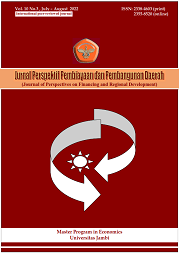Entrepreneurial interest in startup business based on entrepreneurial literacy and digital literacy
DOI:
https://doi.org/10.22437/ppd.v10i4.18819Keywords:
Digital literacy, Entrepreneurial interest, Entrepreneurial literacy, Startup businessAbstract
It is the first empirical research that initiates a model for a growing interest in entrepreneurship among the younger generation based on the two most important literacy in the industrial era 4.0, namely digital literacy and entrepreneurial literacy. Specifically, the purpose of this research is to fill the research gap of the lack of research that examines the interest in entrepreneurship in startups based on digital literacy and entrepreneurial literacy as well as solving problems for the low interest in entrepreneurship in startup businesses among the younger generation. The sample of this research was 406 students of the Faculty of Economics and Business, Universitas Jambi. It was collecting data using a questionnaire. The data analysis technique used Partial least square. The study results showed high entrepreneurial and digital literacy levels and student interest in entrepreneurship. Entrepreneurial and digital literacy has a positive and significant effect on the entrepreneurial interest of students. To foster entrepreneurial interest in startup businesses, it is necessary to provide entrepreneurial literacy to the younger generation, both formally and informally. It is also necessary to increase digital literacy with an education relevant to startup businesses among the younger generation.
Downloads
References
Agusmiati, D., & Wahyudin, A. (2019). Pengaruh Lingkungan Keluarga, Pengetahuan Kewirausahaan, Kepribadian, Dan Motivasi, Terhadap Minat Berwirausaha Dengan Self Efficacy Sebagai Variabel Moderating. Economic Education Analysis Journal, 7(3), 878–893. https://doi.org/10.15294/Eeaj.V7i3.28317
Akinwale, Y. O., Ababtain, A. K., & Alaraifi, A. A. (2019). Structural Equation Model Analysis of Factors Influencing Entrepreneurial Interest Among University Students In Saudi Arabia. Journal of Entrepreneurship Education, 22(4), 2651. Retrieved from: https://www.abacademies.org/articles/structural-equation-model-analysis-of-factors-influencing-entrepreneurial-interest-among-university-students-in-saudi-arabia-8387.html
Alfionita, F., Hasan, M., Tahir, T., & Dinar, M. (2020). Pengaruh Literasi Kewirausahaan Terhadap Perilaku Berwirausaha Mahasiswa Pelaku Usaha Pada Program Studi Pendidikan Ekonomi Fakultas Ekonomi Universitas Negeri Makassar. Indonesian Journal of Social and Educational Studies, 1(2), 87–98. https://doi.org/10.26858/ijses.v1i2.18150
Firman, A., Perdana, A. H., & Putra, K. (2020). Point Of View Research Management The Effect Of Social Media Utilization, Campus Environment And Entre-Preneurship Knowledge On Student Entrepreneurial Interest. Point Of View Research Management, 1(4), 131–143. Retrieved from https://journal.accountingpointofview.id/index.php/POVREMA/article/view/101
Ghufron, M. A. (2018). Revolusi Industri 4.0: Tantangan, Peluang Dan Solusi Bagi Dunia Pendidikan. Proceedings of the Seminar Nasional Dan Diskusi Panel Multidisiplin Hasil Penelitian & Pengabdian Kepada Masyarakat. Jakarta, 2 Augustus 2018. Retrieved from http://proceeding.unindra.ac.id/index.php/dispanas2018/article/download/73/45
Hafiyyan, H. (2022). Pengusaha RI Baru 3,4 Persen, Butuh 14 Persen Untuk Jadi Negara Maju https://ekonomi.bisnis.com/read/20220319/9/1512926/pengusaha-ri-baru-34-persen-butuh-14-persen-untuk-jadi-negara-maju.
Hasan, M., Chalid, I., Arismundandar, A., & Thair, T. (2020). How Does Entrepreneurial Literacy And Financial Literacy Influence Entrepreneurial Intention In Perspective Of Economic Education? Talent Development Excelence, 12(1), 5569–5575.
Hasanah, U. U., & Setiaji, K. (2019). Pengaruh Literasi Digital, Efikasi Diri, Lingkungan Terhadap Intensi Berwirausaha Mahasiswa Dalam E-Business. Economic Education Analysis Journal, 2(1), 1–18. https://doi.Org/10.15294/Eeaj.V13i2.17051
Hendrawan, J. ., & Sirine, H. (2017). Pengaruh Sikap Mandiri, Motivasi, Pengetahuankewirausahaan Terhadap Minat Berwirausaha (Studi kasus Padamahasiswa FEB UKSW Konsentrasi Kewirausahaan). Asian Journal Of Innovation And Entrepreneurship, 2(3), 291–314.
Hidayat, T., Sari, D. Y., & Azzery, Y. (2020). Analisa Prediksi Pertumbuhan Start-Up Di Era Industri 4.0 Menggunakan Metode Markov Chain. Teknokom, 3(2), 1–7. https://doi.org/10.31943/Teknokom.V3i2.45
Iswandari, A. (2017). Pengaruh Motivasi Intrinsik, Pengetahuan Kewirausahaan, Dan Kepribadian Terhadap Minat Berwirausaha Pada Siswa Smkn 12 Surabaya. Jurnal Ekonomi Pendidikan Dan Kewirausahaan, 1(2), 152. https://doi.org/10.26740/Jepk.V1n2.P152-162
Khoiriyah, R., Sudarno, S. & Setyowibowo, F. (2022). Pengaruh Literasi Digital , Efikasi Diri Dan Lingkungan Terhadap Intensi Berwirausaha E-Business Mahasiswa Pendidikan Ekonomi. Jurnal Pendidikan Ekonomi (JUPE), 10(3), 181-193. https://doi.org/10.26740/jupe.v10n3.p181-193
Kuntowicaksono. (2012). Pengaruh Pengetahuan Wirausaha Dan Kemampuan Memecahkan Masalah Wirausaha Terhadap Minat Berwirausaha Siswa Sekolah Menengah Kejuruan. Journal Of Economic Education, 1(1), 46–52. Retrieved from: https://journal.unnes.ac.id/sju/index.php/jeec/article/view/349
Luis-Rico, I., Escolar-Llamazares, M. C., De La Torre-Cruz, T., Jiménez, A., Herrero, Ã., Palmero-Cámara, C., & Jiménez-Eguizábal, A. (2020). Entrepreneurial Interest And Entrepreneurial Competence Among Spanish Youth: An Analysis With Artificial Neural Networks. Sustainability (Switzerland), 12(4). https://doi.org/10.3390/Su12041351
Olokundun, M., Moses, C. L., Iyiola, O., Ibidunni, S., Ogbari, M., Peter, F., & Borishade, T. (2018). The Effect Of Non Traditional Teaching Methods In Entrepreneurship Education On Students Entrepreneurial Interest And Business Startups: A Data Article. Data In Brief, 19, 16–20. https://doi.org/10.1016/J.Dib.2018.04.142
Pateli, A. G., & Giaglis, G. M. (2005). Technology Innovationâ€Induced Business Model Change: A Contingency Approach. Journal Of Organizational Change Management, 18(2), 167–183. https://doi.org/10.1108/09534810510589589
Purwanto, A., Novitasari, D., & Asbari, M. (2022). The Role Of Leadership, Teaching Factory (TEFA) Program, Competence Of Creative Products And Entrepreneurship On Entrepreneurial Interest Of The Vocational School Students. International Journal Of Social And Management Studies (IJOSMAS), 3(5), 58–64. Retrieved from https://www.ijosmas.org/index.php/ijosmas/article/view/185
Rana, K. S., Abid, G., Nawaz, M., & Ahmad, M. (2021). The Influence Of Social Norms And Entrepreneurship Knowledge On Entrepreneurship Intention : The Mediating Role Of Personal Attitude. International Journal of Entrepreneurship, 25(1), 9264. Retrieved from: https://www.abacademies.org/articles/the-influence-of-social-norms-and-entrepreneurship-knowledge-on-entrepreneurship-intention-the-mediating-role-of-persona.pdf
Stefany, S., Nurbani, & Badarrudin. (2017). Literasi Digital Dan Pembukaan Diri : Studi Korelasi Penggunaan Media Sosial Pada Pelajar Remaja Di Kota Medan Sosio Global : Jurnal Pemikiran Dan Penelitian Sosiologi, 2(1), 10–31. Retrieved from: https://jurnal.unpad.ac.id/sosioglobal/article/view/15268/7198
Summey, D. C. (2013). Developing Digital Literacies: A Framework For Professional Learning. Amerika Serikat: Corwin Press.
Sutedjo, B., Oetomo, D., & Santoso, S. (2020). The Effect Of Entrepreneurship Literacy And University Support On Entrepreneurial Interest To Run Start-Up Business Among Students. The International Journal of Business Management and Technology, 4(3), 57–62. Retrieved from: https://www.theijbmt.com/archive/0933/1534383934.pdf
Tahir, T., Hasan, M., & Said, I. (2021). Pengaruh Literasi Ekonomi Dan Literasi Digital. Indonesian Journal Of Economics, Entrepreneurship And Innovation, 2(1), 18–27. https://doi.org/10.31960/Ijoeei.V2i1.1038
Wilson, F., Kickul, J., & Marlino, D. (2007). Gender, Entrepreneurial Self–Efficacy, And Entrepreneurial Career Intentions: Implications For Entrepreneurship Education. Entrepreneurhsip And Theory, 31(3), 387–406.. https://doi.org/10.1111/J.1540-6520.2007.00179.X
Zaki, M.A., Nuzar, I., Saputro, W.E., Prayusta, B.D.S., Mahani, S.A.E., Wijaya, S.B. & Riswan, M. (2018). Mapping Dan Database Startup Indonesia 2018. Jakarta: MIKTI and Teknopreneur Indonesia
Downloads
Published
How to Cite
Issue
Section
License
Copyright (c) 2022 Rike Setiawati, Zulfina Adriani, Besse Wediawati

This work is licensed under a Creative Commons Attribution 4.0 International License.





















